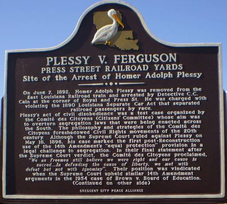Landmark Decision: The Anniversary of Plessy’s Arrest
The arrest occurred during the Jim Crow era when African Americans, under state specific laws such as the Louisiana 1890 Separate Car Act, were subject to sitting in different railroad cars from white passengers. When a bill similar to this was proposed to Louisiana legislature, members of the black community in New Orleans protested. Regardless of their attempts to stop it, the law passed.
In an attempt to challenge the legality of this law, black New Orleanians decided to test the claim. Plessy, a mixed race man, attempted to sit in a “whites only” car of the East Louisiana Railroad. The railroad company had been informed in advance about Plessy’s lineage and his attempt to sit in the “whites only” car and had a detective on board to confront and arrest him. After sitting down, Plessy was confronted and asked to switch cars and when he refused, he was arrested.
The case was brought before a judge in New Orleans, John Howard Ferguson, who upheld the state law. The decision was appealed to the Supreme Court of Louisiana and then the United States Supreme Court, all of whom upheld the decision. Plessy’s challenge was framed using the argument that his constitutional rights were violated, specifically the protections afforded by the 13th and 14th Amendments, which prohibit slavery and guarantees the same rights to all citizens, with equal protections of those right with due process of law. The court rejected that the law implied any inferiority or violated his equal protection since Plessy was afforded a place to sit in a railcar, just a separate one from where he chose.
This was eventually overturned in 1954 when the unanimous Brown v. Board of Education of Topeka decision was handed down, where the court stated that, “separate educational facilities are inherently unequal,” thereby indicating that separating other facilities was unequal as well. It was a major Civil Rights victory and ignited the pathway to equality, not only for Black Americans, but also for many other groups in the following decades. These challenges in the courts greatly influenced the tide of history and left a tremendous impact on our culture and nation.
For more information on Plessy v. Ferguson:
http://www.pbs.org/wnet/jimcrow/stories_events_plessy.html
http://www.history.com/topics/black-history/plessy-v-ferguson

